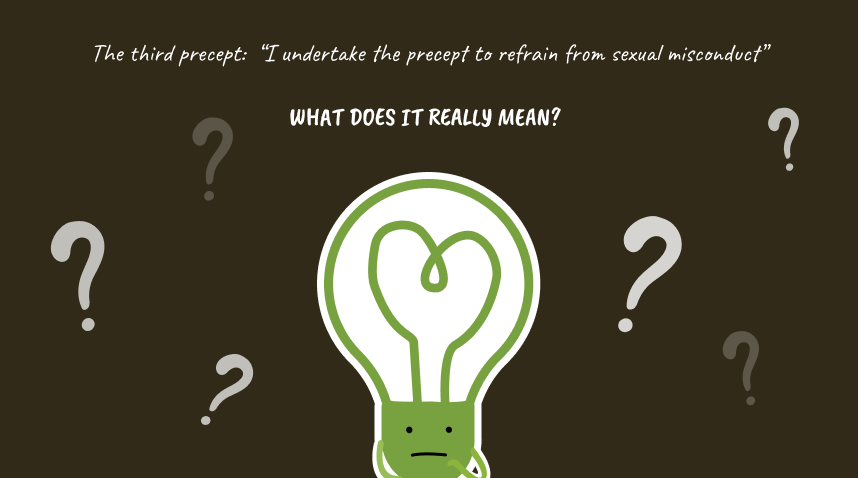TLDR: Precepts = Restrictions? Kyle explores deep into the third precept on sex and how we can comprehend it more holistically. Using three areas of Consent, Respect, Dignity, he sheds light on little known areas of the precept
Buddhist precepts are often mistaken for rules or restrictions, but they are intended to safeguard and guide individuals. However, the third precept, which concerns sexual misconduct, is frequently perceived as ambiguous. Society’s cultural values often blur the line between personal growth and morality, leading to confusion.
As a Buddhist, you may find the third precept challenging to comprehend. Where should you start?
You may be familiar with the Theravada Buddhist temple where lay Buddhists chant in Pali and recite the precept, “Kamesu micchacara veramani sikkhapadam samadiyami,” which translates to “I undertake the precept to refrain from sexual misconduct.”
However, many of us may have unknowingly taken all five precepts since we were young without fully grasping their meaning.
The Third Precept

It’s important to note that as lay Buddhists, we are not required to adhere to the monastic precepts. As a result, the third precept does not outright forbid the act of having sex.
It does, however, explicitly forbid adultery, rape, or sex with someone who is engaged to another, imprisoned, or ordained.
The matter of sexual misconduct is not as straightforward as it may seem.
In Buddhist teachings, the term kāma in Pali refers to the desire for sensual pleasures in general. However, according to the commentaries, it is more specifically related to sexual relations, an interpretation that is supported by the suttas.
On the other hand, micchācāra in Pali refers to wrong modes of conduct, and in the context of the precept, it prohibits improper or unlawful sexual relations.
In essence, any volition with the sexual intention that takes place through the bodily actions and results in a transgression with an illicit partner is considered misconduct concerning sense pleasures.
The Buddha encouraged the spirit of social -cooperation and active participation in society. However, the interpretation of the third precept can differ from country to country and culture to culture and some may argue that the precept is not being followed as it contains an inherent inequality factor.
In the later period of Buddhist development, texts were written to outline several activities that are considered as sexual misconduct.
Historical scholars of Mahayana Buddhism, such as Shantideva and Aśvaghoṣa, viewed non-traditional sexual practices, like same-sex activity, as improper behaviour. Their beliefs were grounded in teachings from the Saddharma-smrtyupasthana Sutra.
In another significant text, The Great Treatise on the Perfection of Wisdom, Nagarjuna, a Madhyamaka scholar, referred to restrictions on non-traditional sex, viewing it as forced action even within marriage.
Importantly, these traditional stances and teachings continue to strongly influence contemporary Tibetan Buddhism.
The perception of homosexual sex as misconduct in Tibetan Buddhist tradition has resulted in discrepancies with other Buddhist schools. In modern times, Buddhist teachers or monastics tend to view these beliefs as cultural rather than canonical.
Ajahn Brahm has been a vocal supporter of the LGBTQ+ community for several years, both locally in Australia and abroad. In the words of Master Hsin Yun, the head of the Fo Guang Shan international order:
Homosexuality has been a topic of debate for a long time, and while some people may have reservations about it, it is important to understand that it is a natural phenomenon.
From a Buddhist perspective, there is nothing intrinsically wrong. It is not a choice, but rather an inherent aspect of an individual’s identity. Therefore, it is important to be respectful and tolerant of those who identify as homosexual.
Homosexuality is not a new concept. People have been identifying as homosexual throughout history and across cultures. It is important to understand that homosexuality is not a mental disorder or illness. It is simply a different way of expressing one’s sexuality.
While some argue that homosexuality goes against religious or cultural beliefs, it is important to remember that people have the right to their own beliefs and values. It is not our place to judge or impose our beliefs on others as practising Buddhists.
It is crucial to treat all individuals with respect and dignity regardless of their sexual orientation. Discrimination or hatred towards the LGBTQ+ community can have serious negative consequences on mental health and overall well-being.
Ultimately, what matters most is that individuals are not harming others. As long as people are consenting adults who are not causing harm to others, their private lives are their own business. It is important to approach the topic of homosexuality with an open mind and heart and to treat everyone with kindness and respect.
Marriage & Buddhism

Regarding marriage and monogamy, Buddhism does not hold a specific stance.
However, some teachers emphasise the value of committed monogamy concerning the third precept. Polygamy, concubines, and courtesans – all common during the Buddha’s time – have no bearing on today’s practitioners. Additionally, the third precept does not prohibit contraception or family planning.
Although early Buddhist texts remain relevant to us today, certain issues such as workplace harassment, relational power dynamics, and dating apps were not present during the time of the historical Buddha.
As a result, these texts offer limited guidance on such matters, requiring us to rely on traditional restrictions and extrapolation to navigate modern-day challenges.
For instance, let’s take the Buddhist concept of ‘Right Conduct’. This principle is part of the Noble Eightfold Path and entails abiding by moral guidelines encapsulated in Buddhist teachings such as non-harm, honesty, decency, etc.
When we apply this to modern-day issues like climate change or social inequality, Buddhists are encouraged to live in a way that doesn’t harm the environment or other people, promote honesty and integrity, and stand up for justice and fairness.
While traditional restrictions do play a role, Buddhism also promotes interpretations based on the central tenets of compassion, understanding, and mindfulness.
Therefore, followers are armed to extrapolate these principles and apply them to new challenges as society evolves. Essential to remember is the Buddha’s guidance to use personal judgment and adapt teachings to their context, keeping the core values intact while responding effectively to contemporary changes.
Why are we still unaware or uncertain about sexual misconduct?
Ultimately, it boils down to CCN (not to be mistaken as CNN, the news broadcasting channel), rather it is an acronym I coined, Consent, Commitment, and Non-harmful consequences that cause harm to oneself and others.
Consent
Consent is an important aspect of any intimate relationship, and it’s essential to ensure that both parties are in agreement before proceeding. There are several factors to consider in determining whether consent has been given.
For example, is the person of legal age to provide consent? Are they in the right state of mind to make the decision? (It’s important to note that an intoxicated mind is not a sound one, well, that’s another precept we will talk about another day). Is the person being threatened or coerced into giving their consent? All of these factors must be taken into account to ensure that consent is given wholeheartedly.
It’s not always easy to determine whether someone has given their consent, especially if they are not able to vocalize their agreement. In such cases, it’s important to be extra cautious and take steps to obtain affirmative consent.
For instance, if someone appears hesitant, unsure, or uncomfortable, it’s important to ask them directly if they are okay with what is happening. Similarly, if someone has previously given their consent but later changed their mind, it’s essential to respect their wishes and stop immediately.
In addition to obtaining affirmative consent, there are other ways to ensure that both parties are comfortable and on the same page.
Setting clear boundaries: Before engaging in any intimate activity, it’s important to discuss what is and is not okay. This includes discussing what types of touching are acceptable and what areas of the body are off-limits.
Checking in regularly: Throughout any intimate encounter, it’s important to check in with your partner to ensure that they are still comfortable and consenting to what is happening. This can include asking questions like “Is this okay?” or “Do you want me to stop?”
Respecting nonverbal cues: Not everyone feels comfortable vocalizing their consent, so it’s essential to pay attention to nonverbal cues like body language, facial expressions, and sounds of pleasure or discomfort. If your partner appears uncomfortable or in distress, it’s important to stop immediately and check in with them.
Overall, obtaining affirmative consent and respecting boundaries and nonverbal cues are essential to ensuring that all intimate encounters are consensual and enjoyable for both parties. Remember, consent is not just a legal obligation, but a moral one as well.
Commitment
When it comes to dating, understanding your status is crucial to avoid misunderstandings and hurt feelings.
If you are legally tied to another person, such as being married or in a civil partnership, then you are not free to date anyone else. Engaging in romantic or sexual relationships with others while still in a committed relationship is considered cheating and can be very damaging to all parties involved.
If you are not legally tied to anyone but are in a committed relationship, such as being engaged or in a long-term partnership, then you are also not advised to have any sexual relationship with anyone.
Even if you haven’t made any formal vows or signed any legal documents, being committed to someone means that you have made a promise to be faithful and loyal to them.
It’s important to communicate clearly with your potential partners about your status and what you are looking for. If you are not interested in anything serious and just want to have fun, make sure the other party knows that.
Cheating in a committed relationship can cause harm to oneself and others, leading to emotional pain and damage to trust and relationships. It is an unethical behaviour that goes against the values of integrity and fairness. Communication and working together to resolve issues is crucial. Cheating is never the solution and will only lead to more problems in the long run.
Non-harmful consequences
This is tricky as it is determined fully by your intention. Are you doing it as part of a bet with your friends? Is it to get back at someone who previously rejected you? Or are you leading someone on just for fun? Are you drugging someone to make them unconscious?
It’s important to consider the consequences of engaging in sexual activities with ill intent to harm, feeling unsafe afterwards or finding out that the other person had lied about carrying a certain disease.
Let’s gently shed light on the topic of diseases transmitted through sexual activities. While sexually transmitted diseases (STDs) might be the most commonly discussed, it’s crucial to acknowledge that illnesses such as Hepatitis C can also be shared in this manner.
Moreover, our understanding extends compassionately towards those living with HIV. With modern advances in treatment such as Antiretroviral Therapy (ART), individuals can achieve an undetectable viral load, meaning HIV cannot be passed on through sexual activity – a truth eloquently captured in the expression, U=U (Undetectable = Untransmittable).
Recognizing this reality, it becomes clear that stigmatizing someone based on their HIV status can have deeply hurtful implications, often making them feel undeserving. As compassionate beings, it is our duty to foster an environment of understanding and empathy.
The Interplay Between Obsession and Addiction
It’s not just about actions that harm others; sometimes it’s not clear how our actions can be detrimental to ourselves. Obsessions can be difficult to manage, and when they spiral out of control, they can become a harmful force in our lives.
Whether it’s an obsession with a particular person, sex, or porn, the consequences of unbridled obsession can be severe.
In some cases, obsessions can even lead to addiction, which can have long-lasting and devastating effects on our physical and mental health, as well as our relationships with others.
As Buddhists, we understand that desire (Taṇhā) is insatiable, and that seeking satisfaction in samsara is ultimately a futile pursuit. However, this does not mean that we must abandon all worldly pleasures and live a life of asceticism. Rather, it’s important to be mindful of our desires and to cultivate a healthy relationship with them.
To practice mindfulness in the world of sensual pleasures, we must be conscious of the extremes. We must avoid becoming so wrapped up in our desires that we lose sight of the needs of those around us.
And if you do happen to break the precepts, follow what Ajahn Brahm advises by acknowledging it and asking for forgiveness.
It’s understandable if you find this information overwhelming, and I may have already exceeded the given word count for the HOL editor. But this is just the tip of the iceberg regarding the third precept. If you’re interested in learning more, write to us [email protected] perhaps I could write a book on this subject, and readers could donate to HOL to support our collaboration.
Remember, if you’re ever unsure, it’s best not to act.
Wise Steps:
1. Reflect on how you understand and apply the concept of consent in your relationships. Ensure all intimate encounters are fully consensual.
2. Consider whether you are in a committed relationship and communicate clearly about expectations with potential partners to avoid misunderstandings.
3. Learn to manage desires and obsessions in a balanced way without letting them spiral out of control in a harmful manner.
4. If you have any doubts about applying the third precept in a modern context, consult Buddhist teachers to gain a deeper understanding and get clarification on issues.


